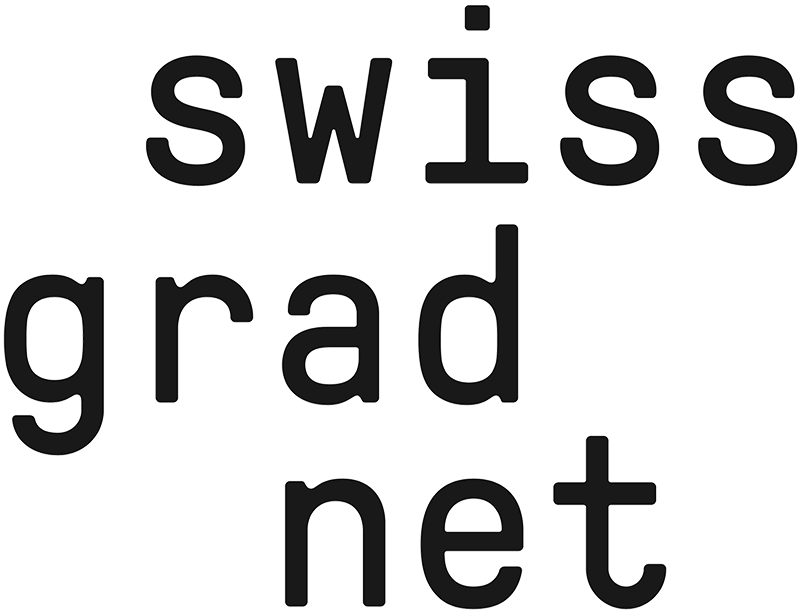Programme
Can a machine design?
Implications of artificial intelligence for the future of art and design universities
The third SwissGradNet Discovery Conference, which took place online on Friday, October 3, 2021, placed the focus on the implications of a future shaped by AI for higher education institutions. Together with exponents from the creative industries, the arts and universities, relevant fields of action for the successful further development of teaching and research at art and design universities were outlined.
Context
The digital transformation is rapidly advancing. Increasingly, Artificial intelligence plays a defining role in the lasting changes that living and working environments are undergoing. In the private sector, in the sciences, in public institutions, and in design and art, self-learning systems are used to optimise the analysis of unfathomable amounts of data, to automate processes, and to develop and design solutions. On the one hand, this development is driven by an optimistic hope of having found a new path to overcoming the complex problems of this world; on the other hand, advocates of technological singularity stoke old fears of a super-intelligence that could outstrip the creative genius of humanity and assume power over it. AI raises ethical and legal questions when algorithms make decisions that affect society.
AI is no longer just a common narrative in cultural history; it is used by designers and artists as a matter of course, a tool in the design process and artistic work. At the same time, algorithms learn to paint pictures or design products on their own. This raises far-reaching, recurring questions on the implications of AI for the creative industries and the arts, and not least on higher education institutions. Not only are professional profiles and fields of work changing, but also the demand for professional expertise. Skill profiles will have to develop to survive in the labour market. Some of the future competencies propagated, such as creative thinking or problem-solving skills, correspond to those transversal competencies that have always been taught in design and art education. Considering which, the question for design and art universities in the context of digital change and AI is not only how their institutional mandate in education and research should be fulfilled, but also the reverse: what and to what extent can they contribute to the further development of other disciplines and professional profiles.
Conference programme
Speakers and hosts
Conference concept
Literature list
Hosts
The 2021 SwissGradNet Discovery Conference was hosted by:
Dean of the Lucerne School of Art and Design, Lucerne University of Applied Sciences and Arts
Head of the Competence Centre for Art and Design in Public Space, Deputy Vice Dean Head of Research, Lucerne University of Applied Sciences and Arts – School of Art and Design
Vice Dean, Head of Bachelor’s and Master’s Programmes of the Lucerne School of Art and Design, Lucerne University of Applied Sciences and Arts
Vice Dean, Head of Interdisciplinarity and Transformation of the Lucerne School of Art and Design, Lucerne University of Applied Sciences and Arts
Head of the Interaction Design Lab, University of Applied Sciences and Arts of Southern Switzerland, SUPSI
Head of the PhD Research Programme and Interdisciplinary Design Studies, Discipline Lead of Science and Liberal Arts, National Institute of Design (NID), Ahmedabad
Head of the Visual Arts Department, Valais School of Art, édhéa
Professor Filmuniversität Babelsberg KONRAD WOLF
Director City Science Lab, HafenCity University Hamburg
Head of FabLab & Researcher, University of Applied Sciences and Arts of Southern Switzerland, SUPSI
Head of the Bachelor’s Programme in Digital Ideation, Lucerne School of Art and Design, Lucerne University of Applied Sciences and Arts – School of Art and Design
Project Head Research & Head of International Relations, Coordinator SwissGradNet, conference organisation, Lucerne University of Applied Sciences and Arts – School of Art and Design
Patric Fasel
Lecturer, Master of Arts in Fine Arts, conference organisation, Lucerne University of Applied Sciences and Arts – School of Art and Design
Previous
Conferences
Discovery Conference No. 2 – October 2019
“Dissemination as Knowledge Production in Use-inspired Research.”
Discovery Conference No. 1 – September 2018
“What is the practice in use-inspired research in design, film and art?”
